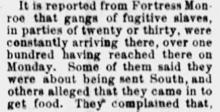NEGROES TAKING REFUGE AT FORT MONROE.
It has been a subject of considerable apprehension with the Union men as well as the Secessionists as to what the slaves would do in the present unfortunate and unprecedented state of the country. The hatred of compulsory labor, however moderate, is so strongly implanted in the African breast, that those who knew them best felt assured one of the greatest difficulties the South would ever have to contend with would be the peculiar institution itself, in whose behalf Secession had been undertaken. The promptness and sagacity of General Butler have increased the dilemma of the Secessionists to a remarkable degree, since it is as once equally hostile to Abolitionism and Secession. By declaring that slaves are contraband of war he recognizes them as property, and consequently, as liable to capture. When Colonel Mallory, therefore, applied to General Butler for the restoration of his slaves, who had fled to Fortress Monroe, General Butler offered to restore them upon condition of taking the oath of allegiance to the Union, in whose name alone he could demand the fulfillment of the Fugitive Slave Law. It is needless to add that the Secessionist was foiled with his own weapon. Since then a large number of slaves, men, women and children, have "seceded" to Fortress Monroe, and General Butler has made the best possible use of an evil, and employed the able-bodied to work at the entrenchments, while the women have been set to washing, cleaning, &c.
Our artists have sent us several sketches, which illustrate the various methods in which they made their escape and the remarkable risks they ran. There are now about five hundred in the fortress, and are valued at half a million of dollars. Thirty of these belonged to a planter in Richmond, who visited General Butler to confer with him. Upon his asking if he might take them back, the General said that they came of their own accord, and could go back if they wished. They, however, decided to remain, whereupon the planter manumitted the entire lot, and returned to Richmond.
It is reported from Fortress Monroe that gangs of fugitive slaves, in parties of twenty or thirty, were constantly arriving there, over one hundred having reached there on Monday. Some of them said they were about being sent South, and others alleged that they came in to get food. They complained that, whilst they were kept at work in the sandhills, the soldiers ate up all the food. Some of them were free negroes, who had been compelled to work upon the enemy's fortifications in and near Norfolk.
...[ACCOMPANIED BY IMAGES WITH THE FOLLOWING CAPTION]:
Stampede Among the Negroes in Virginia --Their Arrival At Fort Monroe
"Negroes Taking Refuge at Fort Monroe," New York (NY) Frank Leslie's Weekly, June 8, 1861, p. 55.

